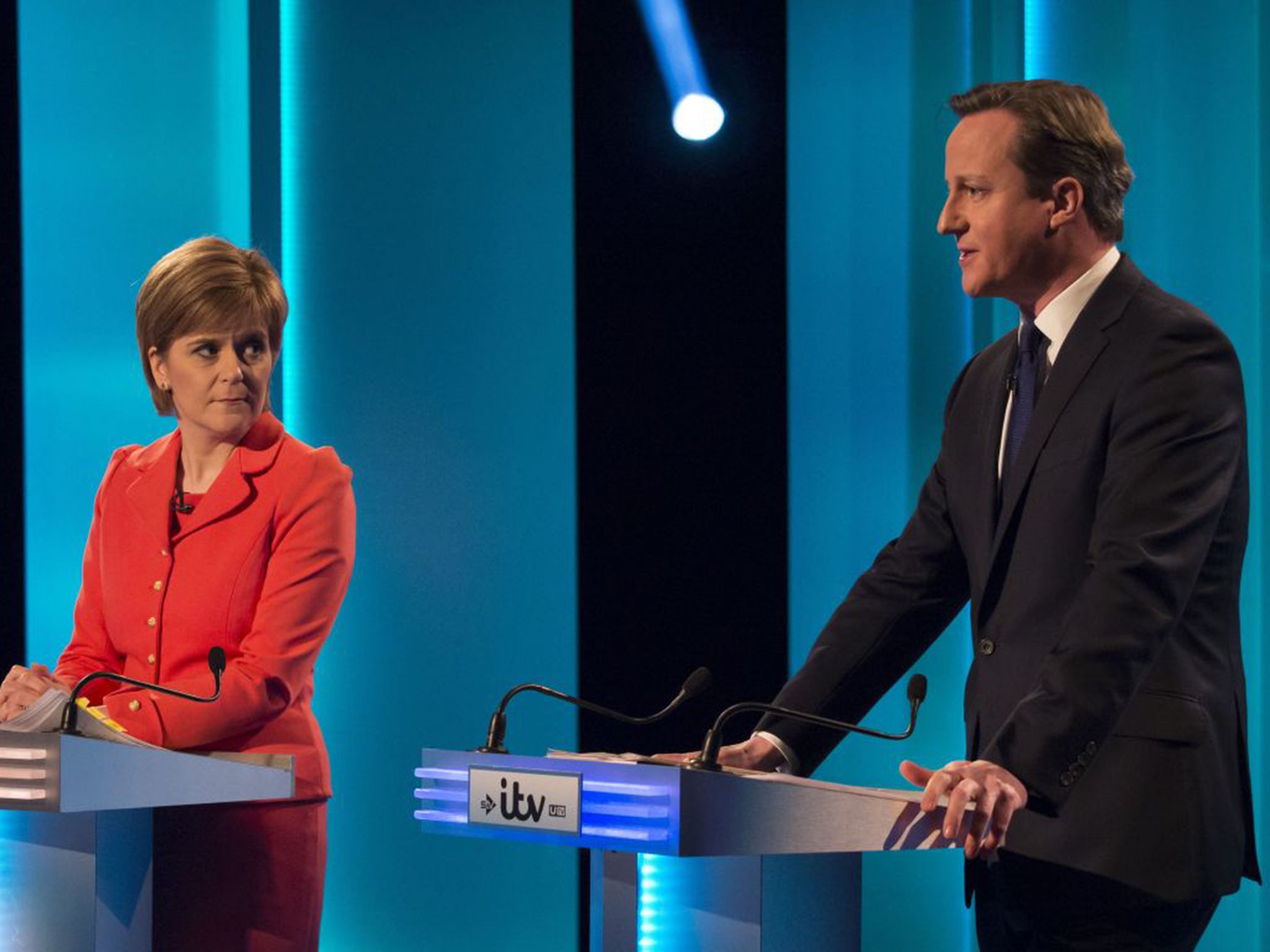General Election 2015: What if Cameron were to end up in debt to the SNP?
In combination with other opposition parties the SNP could defeat David Cameron at key moments and might be inclined to do so


This protracted campaign ends with the choice before voters still hidden away. It began with a raging debate about whether there should be TV debates. When this incestuous row was resolved messily the focus moved to what would happen after the election. The dominant question for weeks has not been what each party might do in power, but whether a Labour government would be held to ransom by the SNP.
The overwhelming prominence of this topic reflects the renewed dance between the Conservative leadership and its newspaper supporters. The partnership became distant under New Labour, but the two are back on the dance floor in this election, rocking like they did in 1992.
Most voters do not watch politics around the clock. They are dependent still on the mediators, many of whom seek to alarm them by raising fears that are the opposite of the truth. This zeal of the brainwashers is dangerous as well as disturbing. When post-election events move differently, some voters’ disillusionment with democratic politics will be greater than it already is.
Are you undecided about who to vote for on 7 May? Are you confused about what the parties stand for and what they are offering? Take this interactive quiz to help you decide who to vote for...
Here is the reality. In a hung parliament, a party of the SNP’s likely size will have considerable influence over any government. It has already played its bargaining cards in relation to Labour. Its leaders have declared they would not trigger the downfall of a Miliband government. Therefore, Alex Salmond and co would hold much more sway over a minority Conservative government. In combination with other opposition parties the SNP could defeat David Cameron at key moments and might be inclined to do so.
Labour is largely culpable for the rise of the SNP in Scotland and there will be an almighty post-mortem examination after the election, but that is a separate issue from whether Ed Miliband would be held to ransom. In a hung parliament Cameron would be more vulnerable and obliged to spend more time in discussion with the SNP’s Westminster contingent.
In spite of the myths propagated by the dancing partnership of the Conservative leadership and its newspapers, there are still few excuses for voters to be surprised by what would follow Cameron’s return to No 10. The party’s leading figures are fairly candid. Still in thrall to 1980s-style Thatcherism, they pledge a smaller state, a further fracturing of underfunded public services and a referendum on the EU.
Similarly when Cameron and George Osborne copy the Tory tactics of the 1992 campaign, warning of tax bombshells, they no longer take off as they did then. Voters want some new ideas from the right. There are indications of fresh thinking from senior figures in the party advocating new forms of compassionate conservatism, recognising that there are limits to markets and that the state can be a benevolent force as well as an inefficient, stifling one. If the Conservatives lose, perhaps a genuinely substantial One Nation leader might emerge to move them on from their deadly intoxication with Thatcherism and a right-wing leadership in constant battle with others even further to the right.
Nick Clegg needs to be very careful as he makes plans to give space once more to that right-wing leadership. Clegg does not deserve the endless attacks on his integrity. He is a decent public figure who has again performed well in this election. But there are urgent questions about his judgement in the last parliament for failing to recognise the political consequences of the rise in university tuition fees and enthusiastic support for Andrew Lansley’s NHS reforms.
Now he stands ready to form another coalition with Cameron in which the Tory leader holds his in/out referendum on Europe. That would be staged in 2017, mid-term when governments are unpopular. Clegg was unable to win a referendum on electoral reform in the last parliament when the anti-politics mood made it very winnable. The referendum in Scotland has hardly been a triumph. Leaders lose control of referendums.
Clegg can justify much of what he did in the last parliament, but he will not want to go down in history as a pro-European who facilitated the UK’s withdrawal from Europe. He risks such a place in history.
As I wrote last week, nothing is quite what it seems in politics. In 1997 many Labour voters assumed they had voted for sweeping radical change when, in reality, Tony Blair had stood on the most cautious incremental manifesto of recent history. Voters who thought a new day had dawned were doomed to be disillusioned. This time Miliband does seek radical reforms on several fronts and yet some voters, not least in Scotland, choose to be disillusioned in advance.
This is a restive country, insecure, nervously dependent on fractured and underfunded public services. Miliband understands that government can be a benevolent force and that we cannot rely on markets alone to deliver a civilised quality of life. Whenever he has challenged orthodoxy the tide has tended to move with him, with Cameron forced to cede ground, and voters indicating they supported seemingly unfashionable stances.
The progressive centre-left vote is split several ways, perhaps fatally, but the future of a fragile UK may depend on Miliband getting the chance to implement his ideas. They reflect more closely the current swirling sea change in British politics.
Join our commenting forum
Join thought-provoking conversations, follow other Independent readers and see their replies
Comments